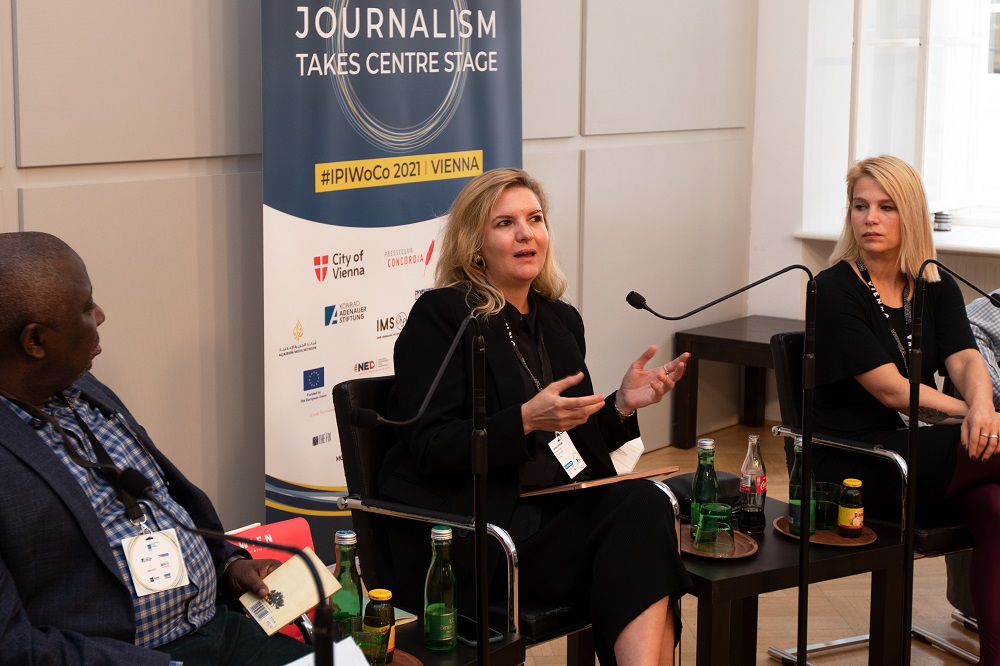You’re under attack from the government, but the business has to go on. How does that work? At the 2021 #IPIWoCo, four editors from Turkey, Hungary, India, and Nigeria discussed modelling the business under repression.
Running a critical and well-functioning news outlet costs money, but installing and maintaining a successful business model can be challenging in countries in which journalism is under threat, panelists agreed. The discussion took place on September 16 at Presseclub Concordia in Vienna as part of IPI’s hybrid 2021 World Congress, and was moderated by Christoph Plate of KAS Media Africa.
Before explaining how news outlets can survive in a repressive state, The Wire’s Siddharth Varadarajan first explored what repression involves. “It can be economic pressure, overt or covert, such as pressuring companies who fund the newspapers”, he said. Similarly, Cansu Çamlıbel, editor-in-chief of Turkey’s Duvar English, added that many outlets perform self-censorship not because they are owned by the government itself, but because the owners of the papers have other interests at stake – “building bridges with President Erdoğan, for example.”
To survive financially, some news outlets instead receive funding from foreign philanthropic organizations. But Çamlıbel stressed that this comes with challenges, too. “You should be very transparent about foreign funding, that is an obligation to your audience.” An outlet can easily be associated with the home country of the sponsor, she explained. “It can cast a sudden shadow on your work. Even if you’re independent from Erdoğan, you might associate yourself with another government.”
To increase independence from the government and companies, The Wire, one of India’s leading digital news outlets, has decided to invest in support from readers instead. “Six years down the road, we are 70 to 80 percent funded by readers”, Varadarajan explained. “We can now sustain ourselves fairly well in the long run.”
In Nigeria, The Premium Times uses a bundle of different streams of finances to ensure the survival of the newspaper, Editor-in-Chief Dapo Olorunyomi explained. One of these streams is a membership programme, announced in 2020, in which the public is asked to make a donation for the sustainability of the paper.
Dapo Olorunyomi (@DapsyOly), the publisher & CEO of @PremiumTimesng, agrees with @duvarenglish editor-in-chief @cansucamlibel that training the next generation of professional journalists is vital for ensuring the long term future of independent media. #IPIWoCo pic.twitter.com/p9qWbFLtLA
— IPI-The Global Network for Independent Journalism (@globalfreemedia) September 16, 2021
Other panelists also highlighted the membership model as useful for keeping outlets running in repressive environments. Veronika Munk, editor of Telex.hu in Hungary, explained how interference by the Orbán government caused around 70 editors to resign, causing the implosion of the outlet. After thousands of people took to the streets to protest Orbán’s interference, Munk realized people actually cared about free media, she explained during the panel. This triggered Munk to set up a successful crowdfunding campaign for a new venture, Telex, which the 70 former Index journalists collectively launched. “We are not the last ones standing but there are very few”, she said. “I think at the last moment, people realized they needed to contribute financially if they want to consume fact-based journalism in Hungary.”
Every day, around 600,000 readers visit Telex’s website, one year after its start. “I think the power of our audience became so big that politicians now say: we need to answer them”, Munk said. “We are now invited to weekly government press conferences and politicians have started listening to us.”
Olorunyomi agreed. “It was very tough at the beginning. But now we are the most influential newspaper in Nigeria, so the government is forced to listen.”
IPIWOCO 2021